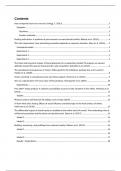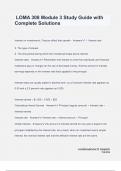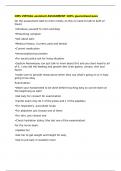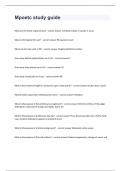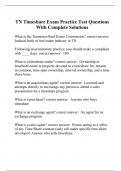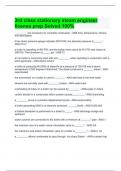What is the problem this research is tackling?
- Goldstein et al. (2008) advocate that companies should give more attention to
default (e.g., the basic form customers receive unless they take action to change
it).
Why should we care about this problem?
- Choosing the right default enhances customer satisfaction and increases profits
while reducing risks for both the company and customers.
How do they approach and solve it?
- Taxonomy and default tool
, What do we learn from this research?
- There are different defaults for every setting. At a basic level, defaults can serve as
manufacturer recommendations.
- Pros:
o We’re acknowledging the manufacturers knows best
o Most companies strive for defaults that are in line with the customer’s
preferences
- Cons:
o Purchase unwanted extras
o Violations of privacy
- Given the power of defaults to influence decisions and behavior both positively
and negatively, organizations must consider ethics and strategy in equal measure
in designing them.
Why are these results important?
- It’s true that some unprincipled companies can (and do) use defaults to exploit
customers. Not only is that unethical, and sometimes illegal, but it often prompts
customers to look elsewhere for their next purchase. Firms that manage defaults
strategically and ethically can expect to be paid back with loyalty and trust.
What is interesting about this research?
- Differences in defaults, ethical aspect
Week 1: Session 2. Motta et al. (2018) Dunning Kruger effect (mostly)
What is the problem this research is tackling?
People low in autism awareness – that is, the knowledge of basic facts and dismissal of
misinformation about autism - should be the most likely to think that they are better
informed than medical experts about the causes of autism (a Dunning-Kruger effect). This
“overconfidence” should be associated with decreased support for mandatory vaccination
policies and skepticism about the role that medical professionals play in the policymaking
process.
Why should we care about this problem?
The Dunning Kruger Effect: individuals who lack expertise fail to accurately appraise their
own knowledge vis-à-vis experts on the subject. The Dunning Kruger effect is an effect
that is prevalent is most big societal problems and it may be important to understand this
effect in order to understand the difference between people.
How do they approach it and solve it?
Firstly, they propose and put to test a new framework for making sense why individuals
hold anti-vax policy attitudes:
1. Individuals low in autism awareness should be more likely to think that they know
more about the causes of autism than medical and scientific experts (Dunning-
Kruger effect)
2. People who think they know more than medical experts will take issue with
expert’s role in the policymaking process related to vaccination. Specifically, they


